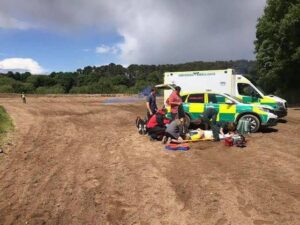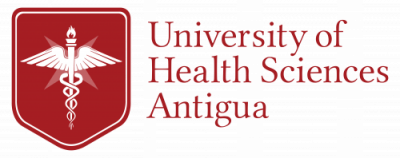
THE IMPORTANCE OF BEING PREPARED
You may have heard the Boy Scout motto, “Always be prepared!” I recently learned the importance of this motto in the life of a healthcare provider. I hope this experience will not only serve as a motivation for you to live your dream of becoming a physician, but also the importance of always being prepared to step in and lend a hand when needed.
Two weeks ago, I was on my way to church when I saw a tractor suddenly veer out of its lane striking an oncoming car before careening into a ditch. Even though I was dressed in a crisp white shirt, tie, dress slacks, and shinned penny loafers, I knew I had a responsibility to act. I quickly pulled to the side of the road. As I alighted from my car, I instructed a bystander to activate EMS and summon police and an ambulance.
As I approached the scene, I quickly realized that the occupants of the struck car were all mobile and seemed in good shape. So, I left them to the ministrations of a group of bystanders. The driver of the tractor was another story. A quick ABC assessment showed that my patient’s heart wasn’t pumping, nor was he breathing. There was no choice but to start CPR. It appeared to me that the cause of the accident was a myocardial infarction (heart attack).
Now, as many of you know, most out of hospital arrests (heart attacks) end poorly. CPR is generally not started quick enough, owing to few trained providers, and automated external defibrillators (AED) are generally not available. But that doesn’t mean we don’t do our best. For twenty minutes, I performed single-rescuer CPR on the roadside, in the dirt, in my dress clothes, before the ambulance arrived. I have never been so happy to hear sirens in my life!
With the arrival of the ambulance, the AED was applied, and we began the process of shocking the patient as the medics and myself tried to restore a proper rhythm. I’m not sure what happened to my patient. As the ambulance departed, all I knew what that they were continuing CPR and shocking as necessary using the AED.
What I did know, was that I felt good. I had done my duty. I had been prepared. And I could go on to church feeling good about myself.
What I didn’t know, and which I was soon to find out, was that in the process of stopping, I had punctured my tire in some broken glass. So, the brave hero proceeded to change his tire on the roadside. As I drove home (I never did make it to church that day), I also had another surprise. The adrenalin was slowly leaving my circulation, and with it came the realization that I’m not 22-years-old anymore, and the combination of CPR and changing a tire on the roadside had left me sore and worn out. Yet, somehow I still felt good about what I had done.
ALWAYS BE READY TO ACT
This isn’t the first time I have had to step in and help out.
As many of you know, I started my career as an advanced practice paramedic (think the physician assistant of 911) in a small town where we provided not only emergency medical services, but also staffed a small urgent care center that cared for the inhabitants of a rural community in the western United States. There were many occasions in the community where I had the opportunity to step in and help someone out in an emergency situation while having lunch in a local café, or just while walking down the street.
I’ve also had my fair share of emergencies while travelling. Before coming to UHSA, my work as a public health doctor (epidemiologist) in the Pacific had me travelling eleven months a year to small islands where people hardly wore clothes, to major metropolises like Hong Kong and Seoul. It was a great time, but it meant lots of time on airplanes.
On at least three occasions, I responded to the call from the purser, “If there are any medically qualified individuals on board, will you please make yourself known to the flight attendants.” One of these occasions was a delirious woman who spoke no English, and who kept losing consciousness at 35,000 feet between Honolulu and Majuro while the pilots skirted a cyclone. Good times!
On another occasion, I stepped in to help on a flight between Aruba and Miami and was assisted by none other than two of my medical students who were on the flight. I didn’t realize they were even on the flight until I heard, “Dr Mangum, where do you need us?” It was a good feeling to know that even at that point in their medical careers, they were willing to step up to the challenge of helping others!
I’ll tell you more about my adventures in pre-hospital medicine in another post. I love to tell these stories. I find them not only entertaining, but also inspirational to my students. But the point is, you never know when your skills will be needed; so be ready!
TAKING YOU FROM A DREAM TO REALITY
If you’re ready to live your dream of becoming a physician, then UHSA can make that dream a reality!
UHSA has been producing physicians since 1982! We are the second oldest private medical school in the Caribbean basin. We know what you need to become a world-class physician, and have three programs to get you there.
Traditional MD Program – if you have the premedical requirements in place, then we would welcome you into our traditional MD program.
MD/Masters of Public Health (MPH) Program – if you have an interest in public health, international health, epidemiology, or even just enhancing your credentials when it comes time to apply for residency, then our joint MD/MPH program is right for you.
Premedical Program – Changing careers? Maybe you don’t have the premedical requirements, but have always had a dream of becoming a doctor? Then our premedical program is right for you. Using the same innovative problem-based learning techniques of our traditional MD program, this will give you the skills you need to earn your MD in the shortest time possible.
Contact our Admissions Team today to learn more!

